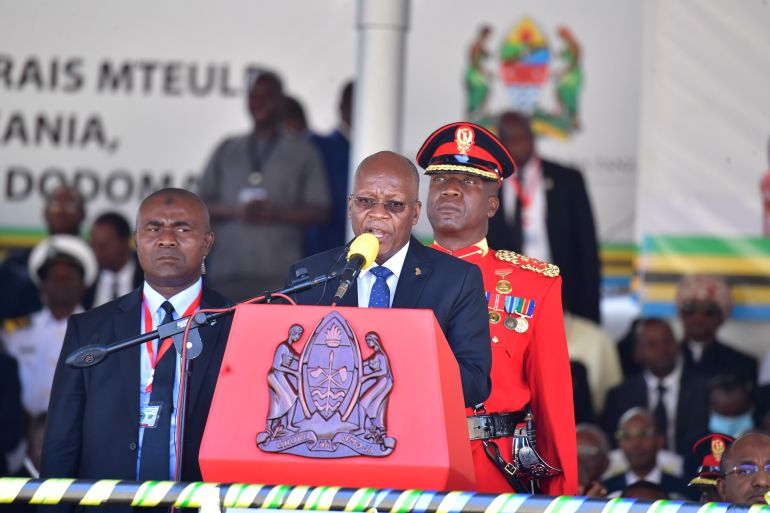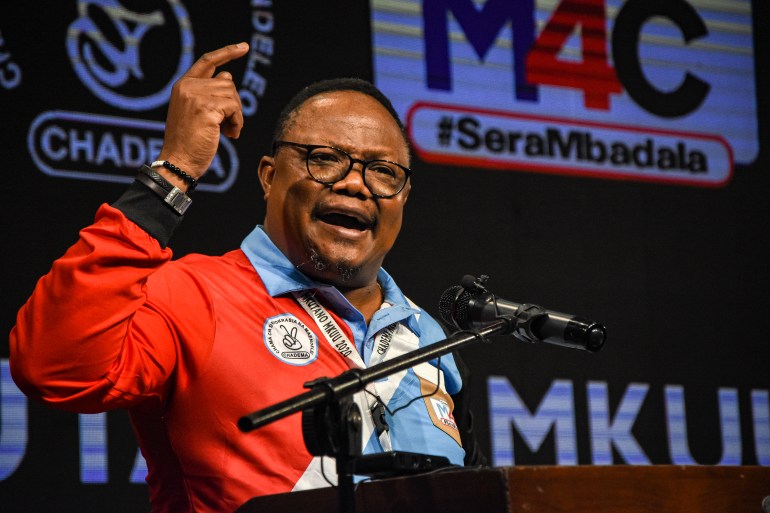Critics decry Magufuli’s ‘unprecedented’ win, rivals’ elimination
Allegations of widespread vote rigging, violence and intimidation during Tanzania’s elections call into question the veracity of the results.

Dar-es-Salaam, Tanzania – John Magufuli was sworn in as Tanzania’s president on Thursday, marking the start of his second five-year term in office as leader of a country which is increasingly divided and facing deep uncertainty over its political future.
Magufuli received 12.5 million – or almost 85 percent – of the total votes in the October 28 presidential polls, Tanzania’s National Electoral Commission said. His main challenger, Tundu Lissu of the Chadema party, got 1.9 million votes, or 13 percent.
Keep reading
list of 4 itemsSummer Lee’s primary race tests fallout for critics of the US’s Gaza policy
Maldives votes in parliamentary elections amid India-China rivalry
Will India’s election be free and fair?
However, numerous reports from opposition parties, observers and concerned citizens alleged widespread vote rigging, violence and intimidation during the elections – calling into question the veracity of the results which led to the governing party’s victory and the decimation of the country’s political opposition.
Results from the parliamentary elections held on the same day showed Magufuli’s party, Chama Cha Mapinduzi (CCM), winning more than 98 percent of parliamentary seats, up from just more than 70 percent in 2015.
Opposition parties rejected the results and called on their supporters to protest across the country.
Demonstrations, however, did not materialise. A large number of security officers were deployed in potential hotspots and threatened would-be protesters with punishment and arrest.
At least 15 people are reported killed and tens of others severely injured by security officers in the semi-autonomous region Zanzibar during outbreaks of violence on the country’s islands during the election period.
Photos and videos shared on social media showed people with bruises and gaping wounds, which they claimed were inflicted by the police. A number of images purported to show the corpses of people killed during clashes with police, or who later died from their wounds.
Ismail Jussa, parliamentary candidate for opposition party ACT Wazalendo from Zanzibar, was on Wednesday flown to Kenya’s capital, Nairobi, for medical treatment, after police beatings left him with severe injuries to his back and leg.
Police have denied the allegations of violence.

After the results were announced, police arrested top opposition politicians, including Lissu. The presidential candidate was picked up outside a compound which hosts several European embassies, while he was waiting to be admitted for diplomatic protection.
Lissu and the other opposition leaders were released on bail after interrogation and intervention from German diplomats, who visited the police station where Lissu was held to help secure his release.
The firebrand critic of Magufuli is now staying at the German ambassador’s residence having sought diplomatic protection, after receiving what he called “credible information” about an imminent attack on his life.
Lissu has indicated that he plans to return to Belgium, where he had spent more than two years undergoing medical treatment after surviving an assassination attempt in 2017, because of the worsening security situation.
‘Victory without precedent’
Analysts and civil society activists expressed alarm over the scale and manner of Magufuli’s victory election and what it could mean for Tanzania’s political landscape.
According to Dan Paget, an expert in Tanzanian politics and professor at the University of Aberdeen, CCM appears to have used all means at its disposal to secure the landslide victory.
“I am surprised by the sweeping scale of the apparent election fraud,” he told Al Jazeera. “CCM seem to have not only manipulated the results but awarded themselves a victory without precedent.”
Activists have long decried the authoritarian backslide over Magufuli’s five years in power, during which opposition parties have been banned from carrying out political activities, media muzzled and many government critics jailed.
What many failed to predict, however, was the almost complete elimination of opposition representation in the parliament.
“Previous elections were marred by irregularities as well but, at least on Tanzania’s mainland, the elections were not stolen outright,” Michaela Collord, a junior research fellow at Oxford University, told Al Jazeera. “In constituencies where the opposition was competitive, it could win. Not so this time.”
CCM – along with its predecessor, the Tanzania African National Union party – has uninterruptedly governed Tanzania since independence in 1961.
Following his victory, Magufulu said: “Getting 84.4 percent is a sign of big faith that Tanzanians have on me. I want to sincerely say that I feel very much indebted, and I promise to repay that debt by working hard, day and night.”
For opposition parties, it is not just the opportunity to challenge government policies and practices from an official platform that has been lost.
Collord said the results would cripple opposition parties’ infrastructures and finances, as parties relied on subsidies based on the number of their members of parliament, since many backers are too scared to donate to the opposition.
“It is unclear, under the current circumstances, how parties will organise and retain some presence on the ground to contest future elections, especially when the credibility of those elections is so uncertain,” Collord said.
Five years ago, Magufuli won the presidency on an anti-corruption ticket. He touted a “Tanzania first” approach to economics, and has made a point of not travelling outside the region during his tenure.
Through this nationalistic rhetoric, he has successfully painted the opposition as saboteurs of the country’s development agenda, smearing them instead as puppets of the Western imperialists, and even traitors.
The government has denied stifling dissent. But Aidan Eyakuze – the director of Twaweza, a civil society organisation championing citizen participation and government accountability – argued the trend of clamping down on the civic space will most likely continue and perhaps tighten even further.
“Since 2015, civil society has, like most sectors, been placed under increasingly tight regulation and control,” he told Al Jazeera.
“In particular the reporting and permission requirements cause significant delays or cancellations in our projects, collaboration between civil society is actively discouraged, and there are moves from government officials to dictate the content and location of our work.”
A third term?
As uncertainty among the opposition and civil society grows, there remains a bigger question lurking in the background.
Magufuli has repeatedly promised he will serve only two terms, in accordance with the current term limit under the constitution.
But several senior party members have suggested removing term limits for the presidency, and the former speaker has declared that this parliament will do everything it can to ensure Magufuli remains in power – whether it is something he desires or not.
“The calls by Magufuli’s supporters for him to accept a third term, and his refusal to, has been played out publicly. It is the enactment of adoration and humility that precedes a coronation, like Caesar being thrice offered a crown,” Paget said.
With its outstanding majority in parliament, CCM has the power to change the constitution unopposed by other parties if it so wishes.
Two-thirds’ parliamentary approval is required for a constitutional amendment.
Collord believes that some ambitious CCM politicians might try to preserve presidential term limits in order to contest the presidency in future, while attempts to remove term limits could also galvanise those quietly opposed to Magufuli within CCM – prompting them to try to block the move.
“But there is reason to believe that Magufuli could overcome these obstacles, relying for support on a cohort of new MPs who won their parliamentary seats at least in part thanks to him.”